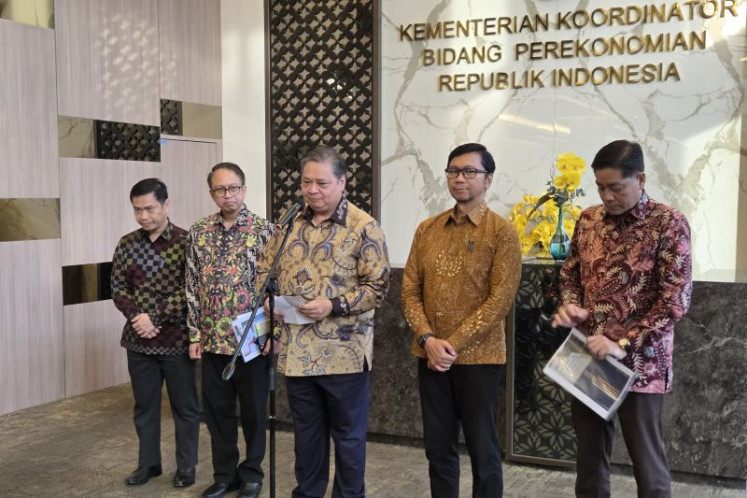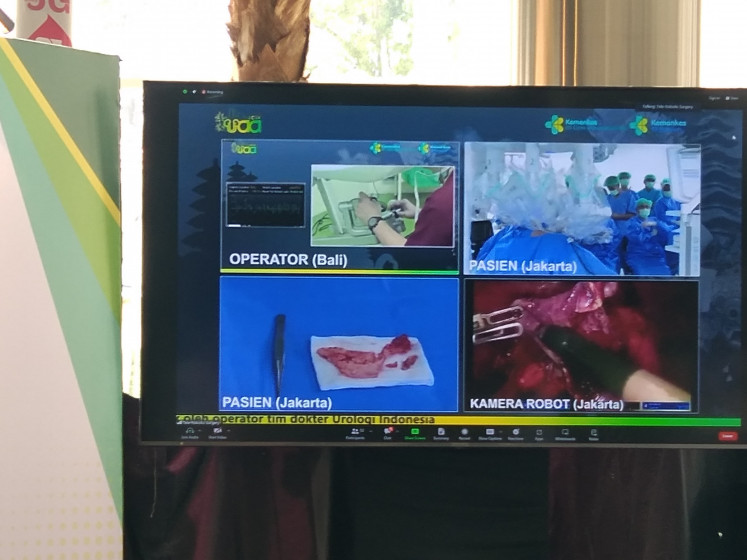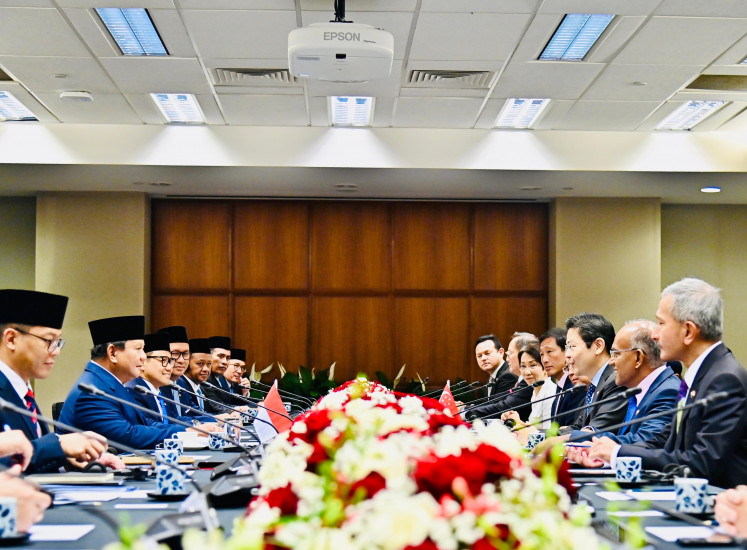Popular Reads
Top Results
Can't find what you're looking for?
View all search resultsPopular Reads
Top Results
Can't find what you're looking for?
View all search resultsChallenges in taxing Netflix
The PMK 48 stipulates that as long as suppliers of digital products via electronic systems have a significant economic presence (SEP) in Indonesia, assessed on the basis of transaction value or number of subscribers, they become taxable corporations.
Change text size
Gift Premium Articles
to Anyone

T
he Finance Ministry has issued ministerial regulation No.48 (PMK 48) requiring businesses that supply digital goods to collect and withhold 10 percent of value added tax (VAT) on their digital products sold and consumed in Indonesia, even though the suppliers are based overseas. The PMK 48 stipulates that as long as suppliers of digital products via electronic systems have a significant economic presence (SEP) in Indonesia, assessed on the basis of transaction value or number of subscribers, they become taxable corporations and collectors of VAT on their products, even if companies do not have to have a permanent establishment (PE) in Indonesia.
The problem though is that traditional VAT collectors are appointed mainly because they are easy targets. For example, mining production sharing contractors are, to a certain extent, in a similar position due to their significant interest in Indonesia. This is not so much the case for tech companies like Netflix or Google. Collecting taxes from purchases made from these companies is known to be difficult, as seen in Argentina. The difficulties lie mainly in two aspects.
First are hurdles in information collection. Companies like Netflix or Spotify have a significant number of subscribers in Argentina. However, without their physical presence, it is difficult to obtain the necessary information to accurately calculate tax, such as the number of subscribers and transaction values, from these companies. So, there is a jurisdictional difficulty.
Second are constraints in tax collection. In the purchase of physical goods, taxes can be collected at the time when the goods are collected. With items purchased from Netflix or Google there is no collection point, posing problems for tax collection. Relying on foreign digital suppliers to withhold tax is considered ineffective. The Argentinian government solves these problems with the help of credit card companies, as most transactions are made using credit cards.
Tech companies like Google or Facebook employ similar business models and consequently pose similar problems, which are unlikely to be solved by PMK 48. Using credit card companies is not an option as most Indonesians do not use credit cards. To evaluate this issue, we can refer to two theoretical frameworks.
The first is the slippery slope framework introduced by Erich Kirchler and other experts. This framework holds that compliance can be obtained either by imposing penalties or persuading taxpayers to comply voluntarily. The latter seems to be preferred in PMK 48, as imposing penalties on companies like Netflix, Google, or Facebook will be ineffective due to jurisdictional difficulties. The assumption is that being tax compliant is beneficial in creating a positive reputation, and companies with a positive reputation can charge a premium price and generate strong customer loyalty, as Robert G. Eccles and others have written.
A tax avoidance scheme is believed to be detrimental to a company’s reputation, such as in reports on Apple’s tax avoidance scheme, and thus harmful to revenue. Hence, making foreign suppliers act as VAT collectors is likely to be ineffective in collecting VAT revenue.
Take for example a purchase of a Netflix subscription. Under PMK 48, Netflix withholds VAT on this purchase and then remits it to Indonesia. This appears straightforward, but without Netflix’s permanent establishment here, enforcing the VAT collection is challenging. As a result, if Netflix does not collect VAT, there is absolutely nothing that the taxation directorate general (DGT) can do.
There is, however, another option; the second theoretical framework called the EAST principle. This principle holds that a policy will be effective if it is easy, attractive, timely and takes social aspects into account. Just going by the “easy” part, Netflix can only perform its business activities if it has access to Indonesia’s internet and payment infrastructure.
Therefore, the providers of such infrastructure, companies like Telkom and local banks, can effectively be made to act as VAT collectors. This is because to make the purchase, Netflix’s customers need to connect their device to the internet, provided perhaps by Telkom, and pay using their savings account in a local bank. The DGT can enter into an agreement with Telkom so that when a person purchases a Netflix subscription using Telkom’s infrastructure, that information is forwarded automatically to the DGT system.
The DGT also receives the same information from the bank. Once it is established that the transaction is subject to VAT, the system instructs the bank to withhold VAT. The bank then takes the VAT payment on the purchase and prints a tax invoice. There will be no option for the customers not to pay VAT as the bank effectively acts as the VAT collection point. Further, the collection cost increase is minimal as it is shared among several parties. For the customers, this solution is simple as they are not required to do anything. Although potentially violating the customers’ privacy, this way is easy and, more importantly, it generates revenue. What do you think?
The writer is lecturer, State Finance Polytechnique (STAN). The views expressed are his own.









